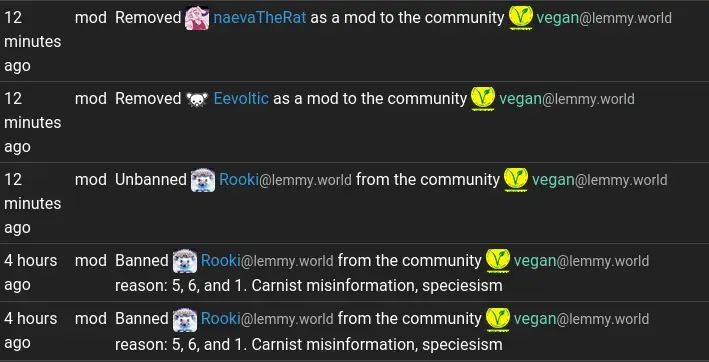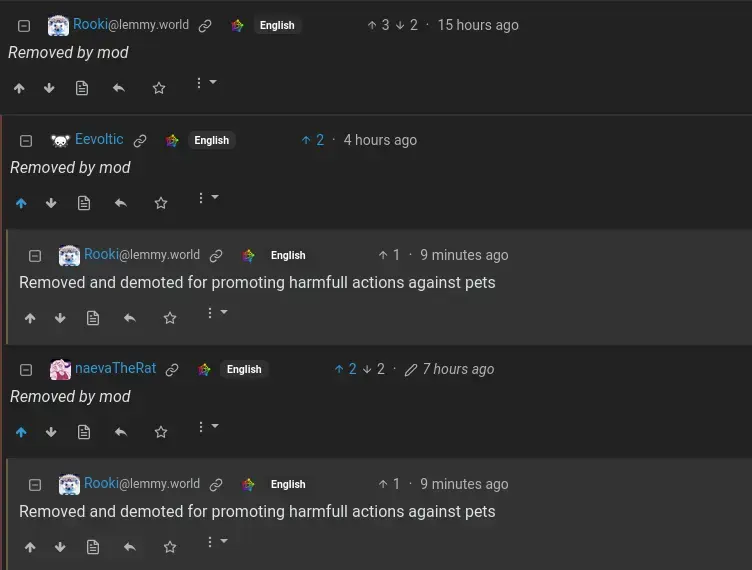4
you are viewing a single comment's thread
view the rest of the comments
view the rest of the comments
this post was submitted on 19 Aug 2024
4 points (52.5% liked)
FediLore + Fedidrama
3140 readers
4 users here now
Rules
- Any drama must be posted as an observer, you cannot post drama that you are involved with.
- When posting screenshots of drama, you must obscure the identity of all the participants.
- The poster must have a credible post and comment history before submitting a piece of history. This is to avoid sock-puppetry and witch hunts.
The usual instance-wide rules also apply.
Chronicle the life and tale of the fediverse (+ matrix)
Largely a sublemmy about capturing drama, from fediverse spanning drama to just lemmy drama.
Includes lore like how a instance got it's name, how an instance got defederated, how an admin got doxxed, fedihistory etc
(New) This sub's intentions is to an archive/newspaper, as in preferably don't get into fights with each other or the ppl featured in the drama
Tags: fediverse news, lemmy news, lemmyverse
Partners:
founded 3 years ago
MODERATORS


Among 1,380 respondents involved in cat diet decision-making, health and nutrition was the factor considered most important. 1,369 respondents provided information relating to a single cat fed a meat-based (1,242–91%) or vegan (127–9%) diet for at least a year. We examined seven general indicators of illness. After controlling for age, sex, neutering status and primary location via regression models, the following risk reductions were associated with a vegan diet for average cats: increased veterinary visits– 7.3% reduction, medication use– 14.9% reduction, progression onto therapeutic diet– 54.7% reduction, reported veterinary assessment of being unwell– 3.6% reduction, reported veterinary assessment of more severe illness– 7.6% reduction, guardian opinion of more severe illness– 22.8% reduction. Additionally, the number of health disorders per unwell cat decreased by 15.5%. No reductions were statistically significant. We also examined the prevalence of 22 specific health disorders, using reported veterinary assessments. Forty two percent of cats fed meat, and 37% of those fed vegan diets suffered from at least one disorder. Of these 22 disorders, 15 were most common in cats fed meat, and seven in cats fed vegan diets. Only one difference was statistically significant. Considering these results overall, cats fed vegan diets tended to be healthier than cats fed meat-based diets. This trend was clear and consistent. These results largely concur with previous, similar studies.
https://theconversation.com/is-it-really-safe-to-feed-your-cat-a-vegan-diet-213356
Most of the health benefits reported for this group also did not reach statistical significance, which may be the result of simply not having enough animals in the study.
The authors reported a tendency towards positive effects of vegan diets. This means there was a general trend (which was sometimes strong), but doesn’t necessarily mean there is a very predictable relationship.
As a survey study, it’s not possible to confirm exactly what the cats were eating. Many of them went outside and may have hunted down meaty treats even while on a vegan diet. Some owners also fed their cats treats and essential nutrient supplements, so any beneficial effects (or a lack of harmful effects) may not be due to diet alone.
Another missing piece of information is how long the cats were kept on the diet. We might assume one year – but this isn’t specifically stated. This is important information since deficiency diseases can take time to develop.
Finally, any study assessing animal health will have inherent limitations if it’s designed as a survey. Pet owners usually aren’t medically trained and their “opinions” can be subjective and therefore biased.
Owners who had removed or reduced meat in their own diet were over-represented in the study. These people may already anticipate vegan diets are better for health, and this thinking could influence their responses.
It’s also worth noting the study was funded by ProVeg International – a food awareness organisation that promotes plant-based products. While this might not have impacted the validity of data, it could have influenced the stance taken when reporting on the results.
I am not convinced that depending on self-reporting of veterinary outcomes from people who are feeding their cat a vegan diet is a reliable way to structure the study
In fact, I would say that purely as a personal and anecdotal conclusion, I believe that the self reporting of an indistinguishable outcome from this study probably means that these vegan diets are harming the cats significantly, if the hidden factor of vegan-diet-feeding guardians underreporting bad outcomes were to be included.
Figure 4 shows the age distribution of tested cats. Most vegan cats have been between 1-10 years while there were many meat fed cats up to 24 years old with a general distribution towards the older ages, while vegan cats drop off sharply after 10 years.
Also there were only 127 vegan cats out of the 1378 overall cats tested. That's not a significant data set to draw definite conclusions from, especially considering how many old meat cats they lumped into the same pot as young vegan cats. At no point in the study do they clean up for age.
I don't trust this study at all. That's what you base the health and wellbeing of animals on?